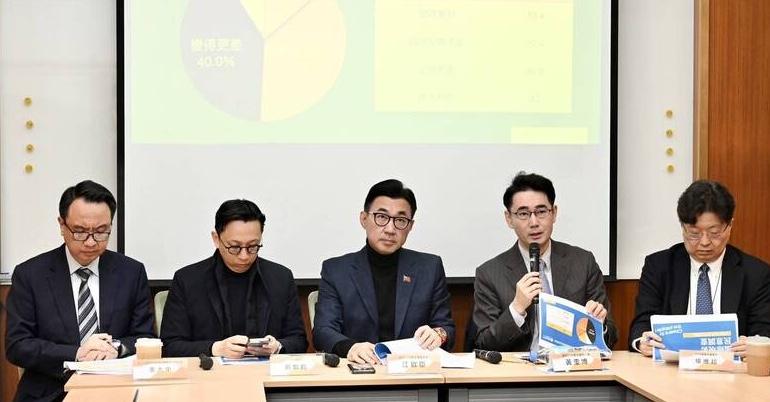The majority of Taiwanese think the nation’s semiconductor industry is a “silicon shield” and that the administration of US President Donald Trump would pressure Taiwan with tariffs, according to a public opinion poll released today by the Foundation for the People.
The poll covered international topics including US-Taiwan relations and Trump administration tariffs.
Regarding tariffs, 85.6 percent of respondents said the Trump administration would likely pressure Taiwan with tariffs in the future, with 52.8 percent believing it is very likely and 10.7 percent saying it is unlikely or impossible.

Photo: Lo Pei-de, Taipei Times
Regarding Taiwan-US trade, 40.6 percent believe trade between Taiwan and the US is fair and reciprocal, while 49 percent said it is not.
Regarding Taiwan-US trade negotiations, 62.4 percent believe the US holds the upper hand, while only 24.8 percent think Taiwan has an advantage.
As for ways to reduce Taiwan's trade surplus with the US, 59.5 percent suggested prioritizing military and weapons purchases, 41.6 percent favor petrochemical energy and nuclear power, 35.4 percent support agricultural product imports, 12.5 percent suggest automobiles and 11.5 percent propose computers and related components.
As for whether Taiwan's semiconductor industry serves as a “silicon shield” that would prompt military intervention from the US and other Western countries if China were to attack, 62.5 percent agreed and 30.8 percent disagreed.
Regarding Trump’s claim that “Taiwan stole US semiconductor business,” 88.4 percent of respondents disagreed, while only 9.5 percent agreed.
Additionally, if Trump were to demand that Taiwan Semiconductor Manufacturing Co (TSMC) transfer its most advanced 2nm manufacturing technology to the US, 84.8 percent of the public would oppose the transfer, while only 10.9 percent would support it.
Regarding US-Taiwan relations over the next year, 13.4 percent said they would improve, 37.4 percent said they would remain about the same and 40 percent said they would get worse.
Trump would continue to use tariffs as weapons and focus on negotiations for various deals, Deputy Legislative Speaker and foundation chairman Johnny Chiang (江啟臣) told a news conference this morning.
Taiwan cannot solely rely on TSMC and the semiconductor industry, and should formulate negotiation strategies and goals as soon as possible, the Chinese Nationalist Party (KMT) member said.
The online poll surveyed nationals aged 20 and above around the country, gathering 1,042 responses from Tuesday to Friday last week.
It was distributed via Facebook and data were adjusted to ensure the sample aligns with the national population structure.
At a 95 percent confidence level, the margin of error was 3.03 percentage points.

US climber Alex Honnold is to attempt to scale Taipei 101 without a rope and harness in a live Netflix special on Jan. 24, the streaming platform announced on Wednesday. Accounting for the time difference, the two-hour broadcast of Honnold’s climb, called Skyscraper Live, is to air on Jan. 23 in the US, Netflix said in a statement. Honnold, 40, was the first person ever to free solo climb the 900m El Capitan rock formation in Yosemite National Park — a feat that was recorded and later made into the 2018 documentary film Free Solo. Netflix previewed Skyscraper Live in October, after videos

Starting on Jan. 1, YouBike riders must have insurance to use the service, and a six-month trial of NT$5 coupons under certain conditions would be implemented to balance bike shortages, a joint statement from transportation departments across Taipei, New Taipei City and Taoyuan announced yesterday. The rental bike system operator said that coupons would be offered to riders to rent bikes from full stations, for riders who take out an electric-assisted bike from a full station, and for riders who return a bike to an empty station. All riders with YouBike accounts are automatically eligible for the program, and each membership account

A classified Pentagon-produced, multiyear assessment — the Overmatch brief — highlighted unreported Chinese capabilities to destroy US military assets and identified US supply chain choke points, painting a disturbing picture of waning US military might, a New York Times editorial published on Monday said. US Secretary of Defense Pete Hegseth’s comments in November last year that “we lose every time” in Pentagon-conducted war games pitting the US against China further highlighted the uncertainty about the US’ capability to intervene in the event of a Chinese invasion of Taiwan. “It shows the Pentagon’s overreliance on expensive, vulnerable weapons as adversaries field cheap, technologically

NUMBERs IMBALANCE: More than 4 million Taiwanese have visited China this year, while only about half a million Chinese have visited here Beijing has yet to respond to Taiwan’s requests for negotiation over matters related to the recovery of cross-strait tourism, the Tourism Administration said yesterday. Taiwan’s tourism authority issued the statement after Chinese-language daily the China Times reported yesterday that the government’s policy of banning group tours to China does not stop Taiwanese from visiting the country. As of October, more than 4.2 million had traveled to China this year, exceeding last year. Beijing estimated the number of Taiwanese tourists in China could reach 4.5 million this year. By contrast, only 500,000 Chinese tourists are expected in Taiwan, the report said. The report